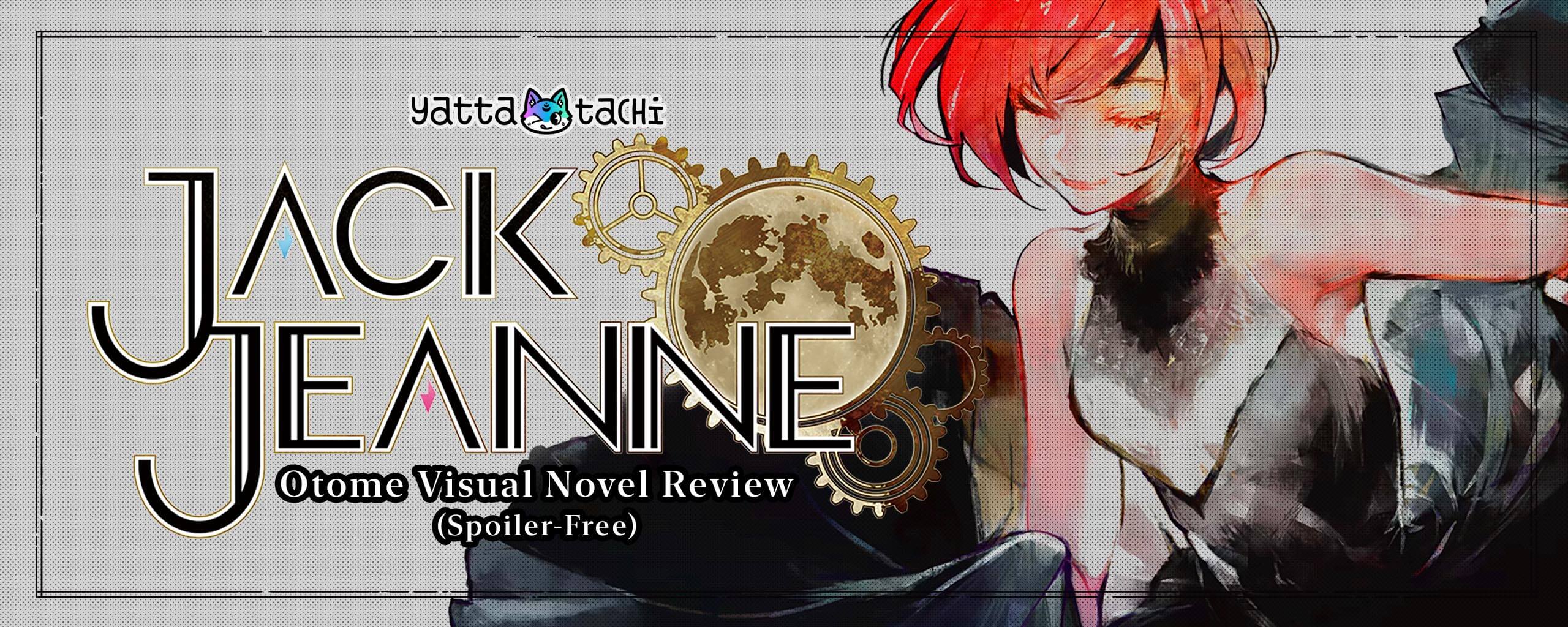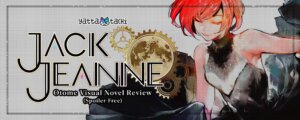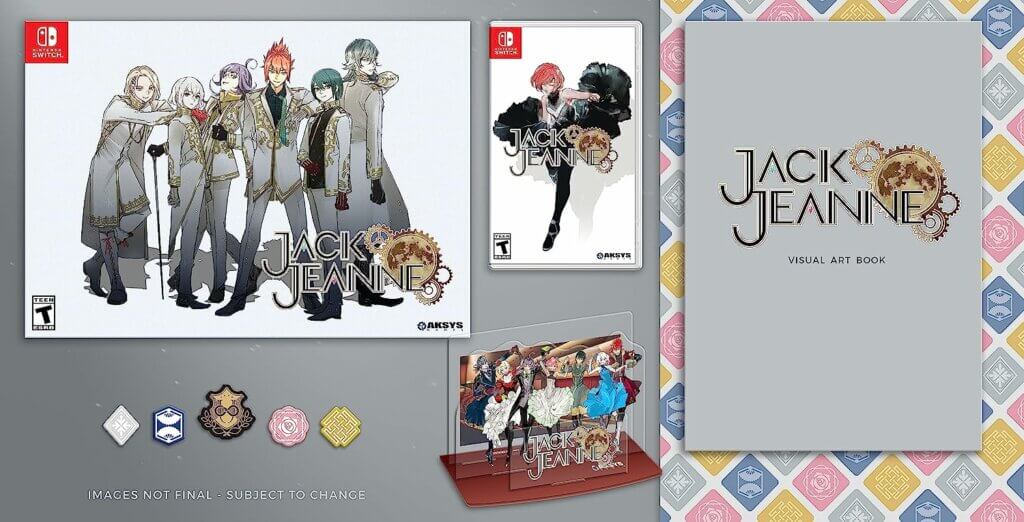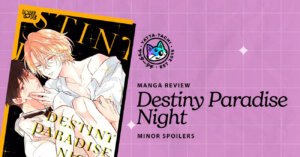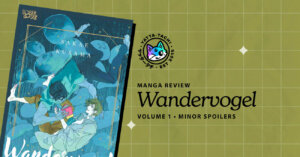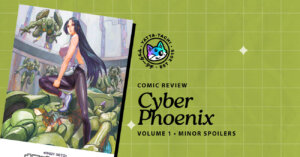Content Warning: Jack Jeanne deals with themes around sexism and gender identity in ways that may not coincide with everyone’s sensibilities. More information on this can be found in the Gender Identity and Themes (Minor Spoilers) section of this article.
Table of Contents
- Game Details & Game Artwork
- Game Trailer
- Storyline
- Art
- Music
- Gameplay
- Characters
- Story & Localization
- Gender Identity and Themes (Minor Spoilers)
- Verdict
- Purchase The Game
- Credits
Jack Jeanne Game Details
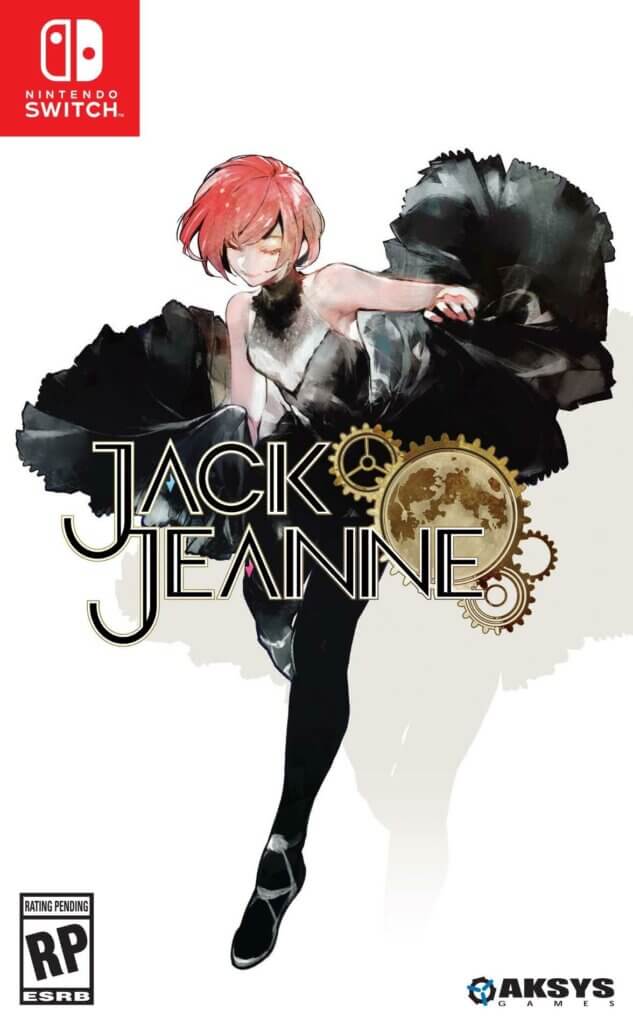
- Genre: Otome Visual Novel, Romance, Rhythm game, Music, School life
- Platform: Nintendo Switch
- Release Date: June 15, 2023
- ESRB Rating: T for Teens (mild violence, mild suggestive themes, and mild language)
- Game’s Official Site: https://aksysgames.com/jackjeanne/
- Developer & Publisher: Broccoli & North America by Aksys Games, Inc (See More Credits)
Jack Jeanne Game Trailer
Jack Jeanne’s Storyline
Kisa Tachibana has always had a passion for acting. Ever since she was little, she, her brother, and childhood friend would put on performances any time they got the chance, and she loved every minute of it.
Fast-forward a few years, and Kisa has just finished middle school. Having lost contact with her brother after he entered Univeil Drama School, a boys-only school centered around the performing arts, she decides not to attend high school and instead enter into the workforce to help her family. After all, the only place she would want to attend is Univeil, but her sex makes her ineligible. Or does it?
Not long before the school is to hold auditions for the upcoming school year, the principal approaches Kisa and gives her a choice: ignore her dreams and enter into the workforce like she plans, or follow a rigorous set of rules and apply to Univeil. He tells her that in order to attend her dream school she must gain the trust of her classmates, get a lead role in the end of the year performance for her class, and most importantly, hide the fact that she’s a girl at all costs. If Kisa can do these three things, she’ll be allowed to study at Univeil. Of course, this all is easier said than done. And before she can even start to work on these requirements, she’s got to pass the entrance auditions first!
Jack Jeanne’s Art
The art is one of the most important aspects of any visual novel, and the fact that Sui Ishida (the writer and artist for Tokyo Ghoul and Choujin X) is behind the art design easily gives Jack Jeanne a win in this department. His unique use of colors, lining, and shading create some of the most beautiful pieces of anime-styled art I’ve ever seen. Each image shows so much depth for both the characters and scene, and emotions seem to fly off the screen each time a CG is unlocked. And though there are well over 100 different CGs to unlock, honestly, I couldn’t get enough.
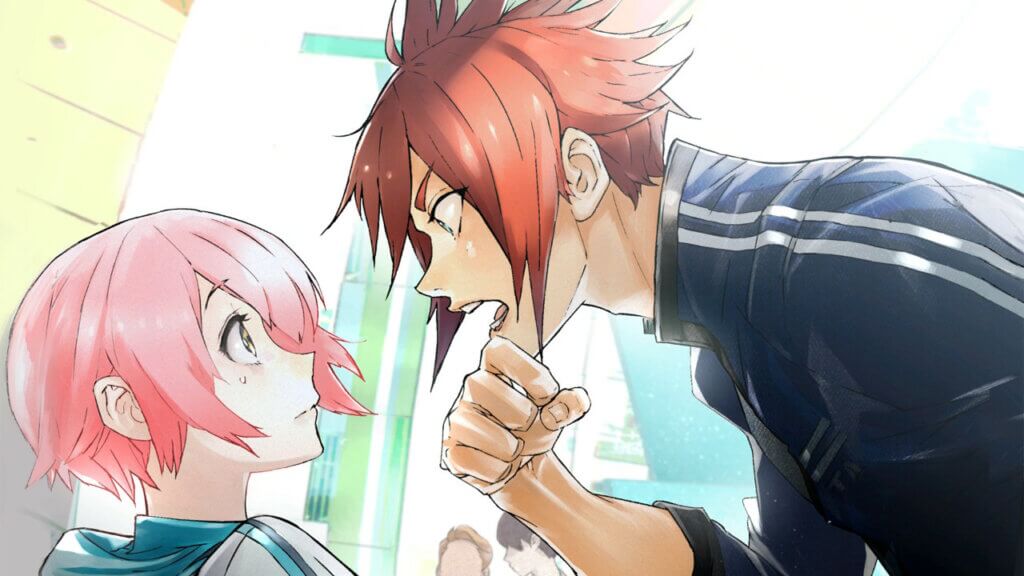
Even outside of the unlockable CGs, the artwork for the characters and backgrounds for the general story are great. Every setting and character is unique, and the variety of backgrounds and character poses is appreciated. I loved seeing the different facial expressions from each character, and the differences between character personalities really shown through thanks to the art. Whether the scene was happy or sad, stressful, angry, or exciting, the art was able to evoke that emotion from me just as strongly as the voice acting and writing.
While I absolutely loved both art styles, I can’t say I thought they went well together. Going from a more typical otome or VN style to Sui Ishida’s unique artwork was jarring at the best of times. In my opinion, the two never flowed well together, and at times the sudden change brought me out of the moment. And as for the handful of 3D sequences with the characters, while I enjoyed what the game makers were going for, I would have preferred they stick to 2D art.
Jack Jeanne’s Music
In my mind, Cupid Parasite has held the title for having the best music of any otome, but I think Jack Jeanne has stolen that away. The general BGM (background music), while excellent, doesn’t hold a candle to the special songs that play during the performances and minigames. They are so incredibly good! I found myself returning to the Gallery to replay the music videos while working or doing chores, and I’m not ashamed to say I would save the game before a minigame just so I could replay the song until I got it out of my system and continue on with the story. I loved how the actual voice actors sang during some of the songs, and I enjoyed Sui Ishida’s lyrics. For real, some of the songs are such bops and they were a highlight of my playthroughs.
Jack Jeanne Original Soundtrack (BGM) on Spotify (Also available on Apple Music)
Jack Jeanne’s Gameplay
Jack Jeanne is one of the most unique and interactive otome games I’ve ever played. While you have the standard setup of making dialogue choices and spending time with a specific love interest to raise their affection and unlock their specific ending, you also have to balance six different stats and play two different minigames. The story takes place over the course of an entire year of school, starting in April and going until February, with the bulk of those days having some kind of interaction.
Monday through Friday, Kisa has class and can choose one of the six different stats to work on each day, with the options being: Run (SP.), Study (IN.), Voice (VO.), Agility (AG.), Develop (CH.) and Act (DR.). Each of these stats is associated with a color, and that color corresponds to one of the six LIs, making it easy to tell which stat relates to who. (The game also tells you this in the beginning, making it super easy.) Each time you select one of these stats, you’ll gain experience for that stat and eventually level up. As you gain levels, it’ll take more and more experience to get to the next one, so keep that in mind when doing blind runs to get the Best endings, which require hitting max level of 30 in each LI’s respective stat. On Saturdays and Sundays, Kisa can choose to go out and spend time with the LIs and other side characters. Not every character will be available every weekend, though. After the first of five performances (more on those in a bit) the option to spend a day out at Mona Star School unlocks, which allows you to spend a weekend day raising a stat instead of visiting someone.
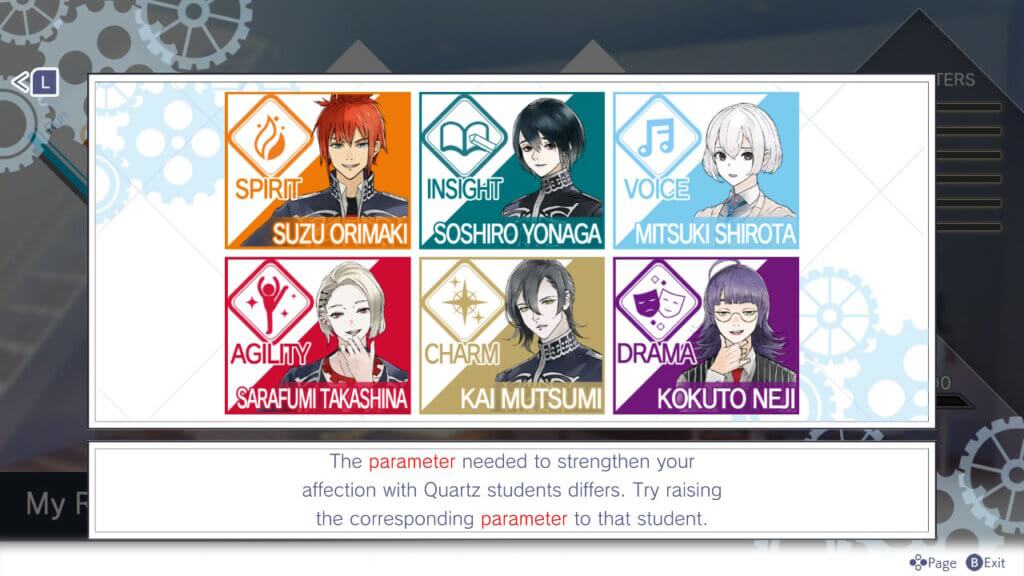
Kisa also has a health bar, with her max health being 100. Spending a weekday practicing will use 10 HP, and once the bar reaches 0, there’s a good chance that attempting to raise a stat will fail. When this happens, you’ll want to use the Rest option to replenish the health bar. Resting is an option on all seven days. You’ll need to balance which stats you raise, when you rest, when to get some extra experience with Mona, and when and who you spend time with on the weekends. There’s a lot to keep track of, but the game streamlines the process pretty well.
Lastly, the game has five performances (Newcomer’s Performance, Summer Performance, Fall Performance, Winter Performance, and Final/Univeil Performance) in which players will have to clear a handful of minigames. There are two types (Song and Dance) with each having three difficulties (Easy, Hard, and Expert). It does not matter which difficulty is selected, it only matters what rating you get for that song. Before each of these minigames, you’ll have the chance to make a save slot, so practicing (or playing for fun over and over like I did) is easy to do. While both of these minigames are simple to learn, Project Diva, Sound Voltex, and other rhythm game fans will be ahead of the curve. I wasted no time in changing my game’s configuration to better match my favorite Miku games and I had an absolute blast playing some of the songs.
To be completely honest, I wasn’t a fan of the stat raising mechanic. Scheduling what classes to take, balancing my affection with the LIs, and keeping an eye on my health bar felt more like a chore than a fun mechanic. There are times when selecting a stat shows the quick (albeit cute) animation of Kisa practicing, then immediately proceeds to the next day, while other times you’ll get anything from a long scene filled with choices, minigame practice slots, and lots of plot progression to short, unvoiced moments with one or more other characters. Sometimes this transition flowed well and felt fairly natural, but those were rare. Instead, I usually found it jarring. There were times where I couldn’t keep pace, and the flow of the plot felt jittery. I would go through an intense scene, then spend the next in-game week getting a handful of voiceless scenes that lasted all of three dialogue boxes each.
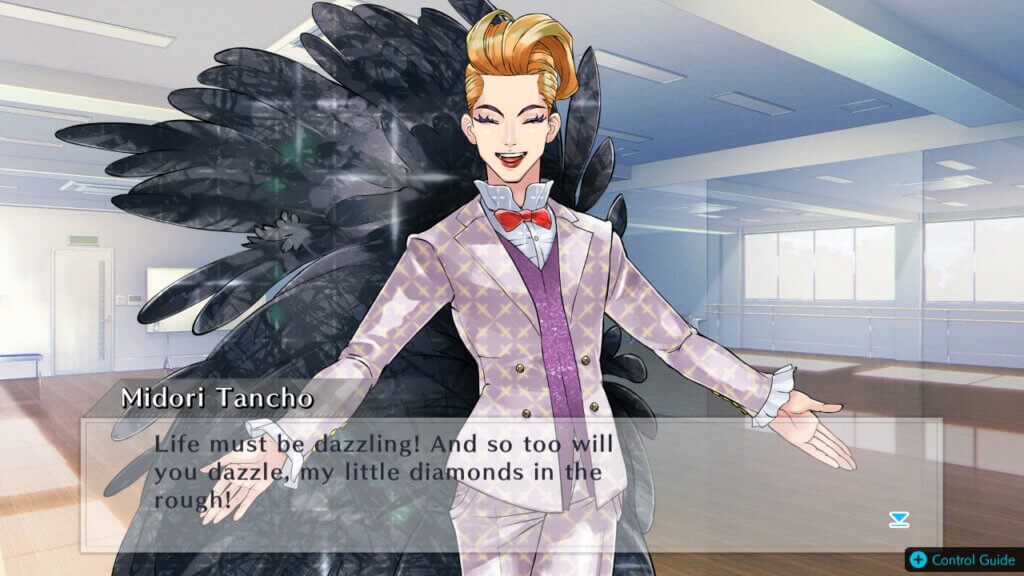
Because each return to the selection menu erased the log, it made it annoying to try different dialogue choices. I’m the type of player that utilizes the log and rewind functions like they’re the only sustenance I need, and having to save the game and reload it anytime there was a choice just so I could see what each decision led to made what was already a balancing game feel like more of a slog.
The game’s Gallery is one of the best I’ve seen. It has common things in it like unlocked CGs, music videos, and the like, but it also has some nice additions I’ve not seen often, with one being the option to replay scenes that unlock CGs. I really enjoyed this aspect, and found myself returning to it a handful of times to get a refresher of a plot point or just to enjoy the moment again. The Gallery also has copies of each of the scripts laid out just as it would be in real life. This feature was an unexpected but very pleasant surprise. As someone who has dabbled in theater and script writing (and as someone who just loves a good story) I really enjoyed being able to read the plays as the writer intended.
One last thing to mention is that I noticed very long load times during my playthrough. Anytime I checked my saves, character affection levels, or went to change something in Options, I had to wait on a black screen for a fair amount of time–long enough that more than once I was worried the game had frozen and I was about to lose hours worth of progress. My playthrough was done on an original Nintendo Switch using a digital copy, so I’m unsure if the newer model Switch or physical copies will have this same issue.
Jack Jeanne’s Characters
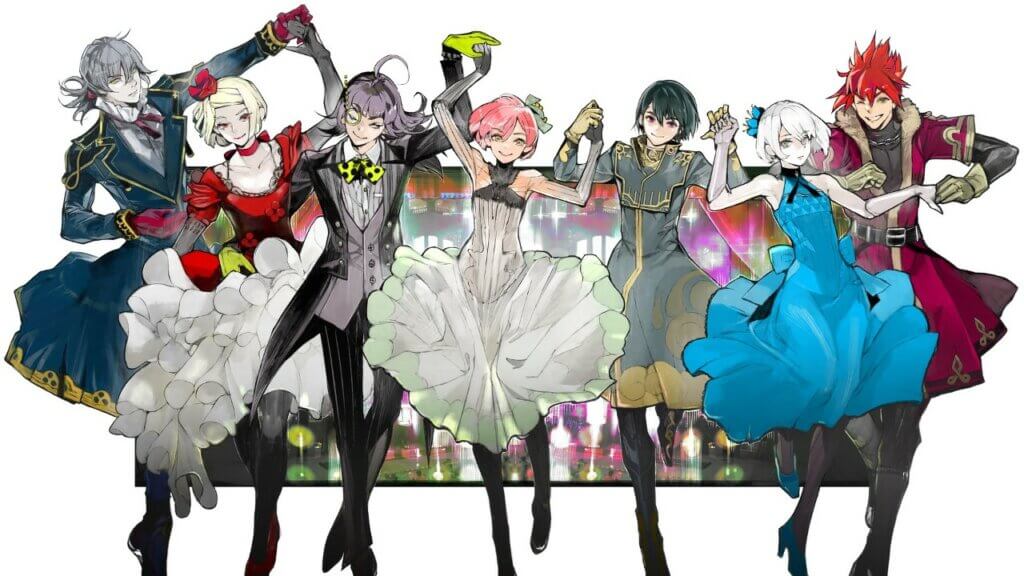
Tachibana Kisa
(CV by Terasaki Yuka / Free!!, Boruto)
Kisa is the protagonist of Jack Jeanne and is voiced! It’s rare to get an otome game where the MC is voiced, and it was such a great addition to the game and story, especially where she had solo songs. Kisa is a pretty laid back character with a lot of determination and a lot of heart. She’s constantly working on herself and is always offering to help others. Kisa doesn’t have a very strong personality so she doesn’t stick out much, but the characters she plays in each of her performances more than makes up for it. She doesn’t have a character image that hovers in the text box like most otome games, and I did find that to be disappointing as I love her character design.
Yonaga Soushirou
(CV by Satou Gen / Horimiya, Fruits Basket)
Yonaga is Kisa’s childhood friend and immediately recognizes her when they’re reunited at Univeil. He’s a quiet and soft spoken person without a lot of self-confidence, but he makes up for that in sweetness. He’s an adorable character that does a lot of growing up to be able to stand with his head held high. Out of all the main characters in Jack Jeanne, Yonaga’s character development was my favorite to watch unfold.
Neji Kokuto
(CV by Kishio Daisuke / Diabolik Lovers, Danganronpa 2, 7’scarlet)
Passionate, eccentric, and a tad bit insane, Neji-senpai is the craziest of characters. Despite having plays provided by the school, he creates totally unique works himself for Quartz. This means he stays up late for days on end to complete the scripts just days after their previous performance, not to mention the fact he usually plays a role in them himself! This versatile actor is a man of many faces, a jack of all trades. But Neji’s bubbly and energetic personality may yet be another mask this performer wears. I love how out of left field Neji can be. His inability to sit still and his layered character made for a great story, the details of which were heart wrenching at times.
Shirota Mitsuki
(CV by Kajiwara Gakuto / Café Enchanté)
Though Mitsuki is quiet and calm, don’t be deceived–this petite tsundere has a sharp tongue. He’s a hard worker and always makes sure to keep from inconveniencing those around him, but he’s not afraid to call people out when they’re annoying or causing problems. And while he believes in Quartz to put on amazing plays, he’s not as confident in himself. Mitsuki is a character that I could relate with, and though it took a bit for me to warm up to his prickly personality, he quickly became one of my favorites.
Mutsumi Kai
(CV by Kasama Jun / Boruto)
Stoic, quiet, and aloof, Kai is the Jack Ace of Quartz. His masculine build and ability to boost his partner’s performance makes him a great asset to the class. But what of himself? Kai is great at providing what others need, but struggles when the conversation turns inward. In a world that is constantly changing, Kai remains static. But can that last forever? Kai reminds me a lot of spring flowers–they’re slow to grow and bloom, but watching the buds make progress each day holds a beauty all on its own. Watching Kai come to understand himself and break out of his self imposed box made for a very sweet story.
Orimaki Suzu
(CV by Uchida Yuuma / Final Fantasy XVI, Final Fantasy XIV, Olympia Soirée)
If you’re looking for a himbo to dote on, look no further. Suzu is loud, energetic, and persistent. He has no filter, and he’s quick to voice his struggles, strengths, happiness, and confusion. He’s definitely the clown of the group, easily adding humor to almost any situation, but he’s also got his own problems that he tries to hide at times. While he knows what his shortcomings are, he’s able to twist them into being strengths in his own way. Like Yonaga, Suzu has extensive character development throughout the entire game that’s a joy to watch.
Takashina Sarafumi
(CV by Kondou Takayuki / Phoenix Wright)
Fumi is the star of Quartz. With a beautiful face, lithe body, and dancing skills that are second to none, it’s no wonder he’s the Al Jeanne (lead female-portraying actor) of the class. Fumi’s cool attitude makes him easy to approach, and his dedication to his roles are an inspiration to everyone, though this is a double-edged sword. Fumi’s incredible acting comes as both motivation and demotivation for those around him. Because of this, Fumi holds himself back. It’ll take a lot of effort for anyone to catch up to him when it comes to ability, but what a spectacle it would be to see Fumi go all out! In terms of design and personality, Fumi is Best Boy. I love how down to earth and approachable he is. He’s forward, but not pushy; talented, but not a show-off; competitive, but wants to have fun above everything else. It didn’t take long for this Al Jeanne to steal my heart.
Jack Jeanne’s Story and Localization
Jack Jeanne is a cute and endearing story of friendship, camaraderie, and lifting others up. There isn’t a moment in the story where the characters aren’t working together to overcome obstacles–whether it’s their own issues they need help solving, or trying to help others find the answers they need. While the day-to-day moments feel like a laidback slice-of-life story, the five performances change the entire mood. The theatrics, music, voice acting, CGs, and stories are so insanely good! While I found myself at times getting bored of the repetitiveness of the ‘daily life’, I would find myself perking up as the performance dates drew near. More than once, I would load my save just before one of the performances started to replay the entire thing. The acting, story, and visuals kept blowing me away in those scenes, and I couldn’t get enough.
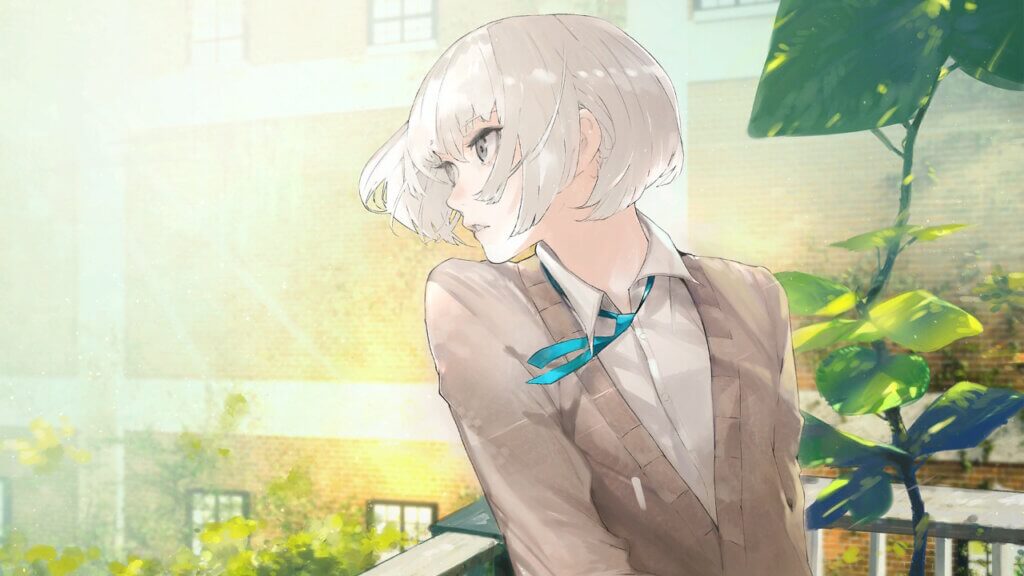
Aksys did a great job with Jack Jeanne’s translation and localization. Though I’ve not played every ending of every route in the game as of writing this, the ones I have played have been free of any major grammar, text, and line issues. Once or twice I found some funny wording, or two back-to-back lines were almost duplicates of each other, but nothing was severe enough to break my immersion or cause me any true issues with understanding the scene.
One of the biggest questions surrounding Jack Jeanne is over whether or not it’s actually an otome. I would definitely put it in the otome category. While no one is supposed to know that Kisa is a girl (though some LIs do) and the romance/romantic scenes are very low-key and don’t happen until the end of any route, the core of the game still fits into the generally accepted definition for otome: a visual novel game with a female MC in which players must make choices and attempt to pursue one of many love interests, most of whom are male. For players looking for something full of romance and heart-pounding scenes, this is not what you want. For all of the beautiful art and writing, developing romantic relationships comes as an afterthought. The game is much more focused on the characters and how they interact with each other, their individual problems and growth, and their shared passion for drama. This doesn’t make the game any less of an otome, just a more unique take on the genre.
Gender Identity and Themes (Minor Spoilers)
Between the obvious themes presented in the game, the fact it was released during Pride Month, and the recent and ongoing political discrimination against members of the LGBTQ+ community in the United States and Japan, I couldn’t stop myself from viewing the contents of Jack Jeanne through an inclusive/discriminatory lens. I discussed some of the game’s events and scenarios with my close friends (all of whom are LGBTQ+), and though we could not come to a definitive conclusion on whether or not the game was inclusive or discriminatory, I felt the need to include this section in my review for anyone who would want more information on this topic before playing the game.
Minor Spoilers to follow.
Though there are no girls allowed to attend Univeil Drama school (high school grades 10-12), the plays put on still include female characters. This means that boys dress as women, applying wigs, body modifiers such as fake breasts and waist cinchers, and feminine makeup styles. There are no comments or objections made about this when it is done for a play. However, there are a handful of characters that dress this way on a daily basis. There is never any discussion on whether or not these characters are genderfluid, transgender, aspiring drag queens, method acting since they are Jeannes (boys who are picked to solely play female characters in plays mostly because of their physical attributes), or any other relevant topic that would shed light on this. The first interaction with these characters is a more comedic scene than a serious one with most of the characters involved in the scene showing confusion and surprise at the discussion. One side character is slightly annoyed or exasperated with these characters, but he is mostly ignored or put down.
Later on, there is a scene where these characters are in girls’ bikinis in a public location. Unnamed strangers in the same area comment on how the female-presenting characters look and use female pronouns for them. The one side character comments on this in what could be construed as a negative way, and when he asks their group leader what he thinks of the situation, the leader responds by saying, “They’re cute, so who cares? It doesn’t matter that we’re guys.” Immediately after, the strangers cry out in comedic fashion, “Huh?! They’re all guys?!”
In the first scene, the game came off as being inclusive of people who do not follow societal gender norms, whether that’s because of how they identify or simply expressing their distaste in how gender is handled culturally. However, the second scene gave me more of a sense that these characters are not actually there in an inclusive way, and instead the gender play is there for comedic purposes. I started thinking of shows and manga like Ranma ½ where gender is only used in the story for the hijinks and nothing more. There isn’t really a serious moment with these female-presenting characters, which further pushed the thought that contextually, the inclusion of these characters wasn’t to diversify the cast at all and instead they were used as props for the plot. I started asking myself things like: Would Univeil allow transgender men? Would they allow nonbinary people? If these characters can be construed as trans women, were they allowed to stay because they started school before their transition, or does the school only care about the gender assigned at birth? And while I know Jack Jeanne is meant to be an endearing story about overcoming trials to achieve your goals and making friends along the way, I couldn’t shake these thoughts, especially since LGBTQ+ issues hit too close to home for me.
After a lot of discussion and replaying of scenes, I came to the conclusion that without any of the developers making a statement, there’s no way to know for sure how these characters are supposed to be seen. There are too many cultural differences between Japan and the United States for subtleties to be known, and even the best of translators and localizers can’t get everything exactly right. I think anyone could make a legitimate argument that the game is attempting to be inclusive without angering the public or breaking any laws in Japan, but it could also be said that this is yet another way that Japan is making light of LGBTQ+ people and that non-serious representation like this does more harm than good. Additionally, with Japan still being the only G7 nation to not have legal protections for same-sex marriage and the country hardly being able to pass even the most scaled back of bills, I can’t help but feel conflicted over the issues presented in the game. I’m not docking it one way or the other for this, but I felt the need to bring these issues to light as anyone looking for serious representation or content will not find it in this game.
Verdict
When I found out that Sui Ishida was working on a visual novel–an otome of all things–I was stoked. As a longtime fan of his artwork and storytelling, I was so excited to see what his mind came up with. I even reread some of Tokyo Ghoul just to feel immersed in his creation before the game launched. Excited doesn’t accurately describe how I felt about this game before playing it. Unfortunately, it turned out this game just wasn’t for me.
I knew going into it that Jack Jeanne was light on romance, and while that was a bit of a bummer for me, I wasn’t prepared for just how little romance was in the game. It was practically nonexistent. While I was disappointed in that aspect, it was the struggle of balancing stats, affection, and HP combined with how boring the day-to-day stuff was that had me struggling to get through the game at times. It made it worse that I didn’t even get cute kissing or other lovey-dovey CGs at the end of my playthroughs to make it worth it.
That being said, I didn’t hate Jack Jeanne. The characters were fun and unique, the writing and localization were great, and I like how this title helps to diversify English otome games. I think this would be a great option for younger people who are interested in VNs and otome in general to start with, especially when more mature content in popular titles can be inappropriate. I also think a good case could be made that Jack Jeanne would be a great pick for players on the asexual spectrum who want a good story and sweet connections without the sexualization of people and relationships.
So while I didn’t hate it, I also didn’t love it. But that’s okay. I think Jack Jeanne will help pave the way for more diverse VNs to enter the English market, which is desperately needed. The story wasn’t for me, but I’m honestly happy about that. Not everything should cater to a singular, specific taste or preference. Though Jack Jeanne isn’t a game I see myself replaying (other than for the songs, because omg they are too damn good), it is one I would still recommend to others. I still bought a physical copy despite receiving a free review copy because I want to promote the game and all the people who worked on it. So no, I wasn’t personally a fan of Jack Jeanne, but I love how different it is to others that have been localized, and I would like to see the genre continue to grow.
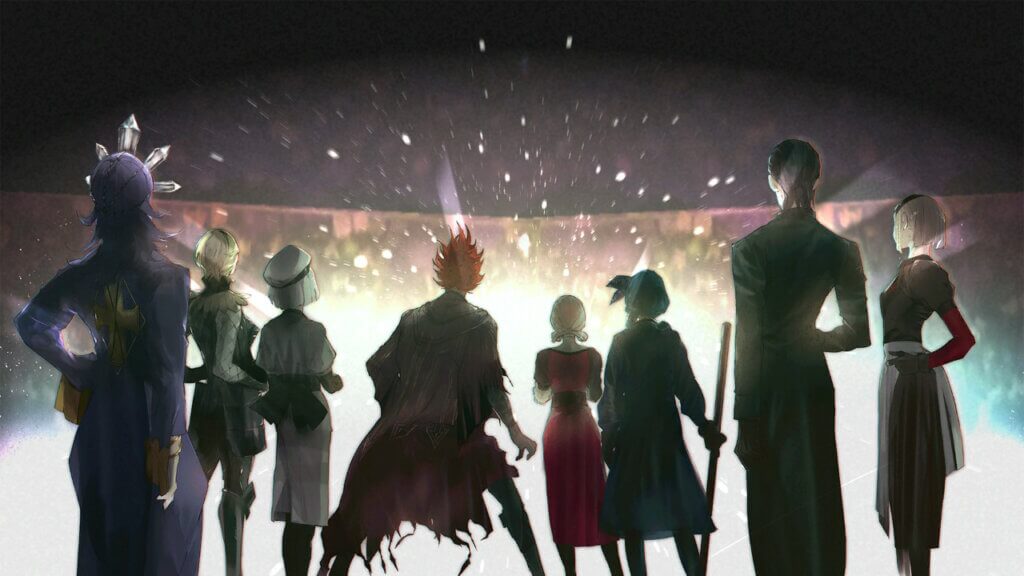
Purchase The Game

Standard Edition
Limited Editions – Gold, Silver, & Bronze
- Purchase on Amazon (Bronze only)
- Purchase on Aksys’ Website
Jack Jeanne Credits
Original Story by Sui Ishida
Scenario by Sui Ishida and Shin Towada
Character Design and Illustration by Sui Ishida
Concept Art by Lownine
Chibi Characters by Maki Touyama
Background Art by Hyde Inc.
Music by Akira Kosemura
Choreography by Seishiro
Sound Production by Magic Capsule Co., Ltd.
Lyrics by Sui Ishida
UI Design by Kimiko Ashiuchi
Planning and Production by Broccoli
Translation and Editing by Engrish Localization
QA Testing by Pole To Win International
Published in North America by Aksys Games
Thanks to Aksys Games for providing a free review copy. Receiving a free copy has in no way impacted the thoughts in this review.
The Good
- Fantastic music, art, and voice acting
- Unique storytelling with fun minigames
- Great for all ages
The Bad
- LGBTQ+ representation is questionable
- Stat balancing is boring and annoying to do without a guide
- Plays more like a slice-of-life rather than a romance sim

Featured Sponsor - JAST
The sweetest romance and the darkest corruption, the biggest titles and the indie darlings; for visual novels and eroge, there's nowhere better.
Big thank you to our supporters
From their continous support, we are able to pay our team for their time and hard work on the site.
We have a Thank-You page dedicated to those who help us continue the work that we’ve been doing.
See our thank you page